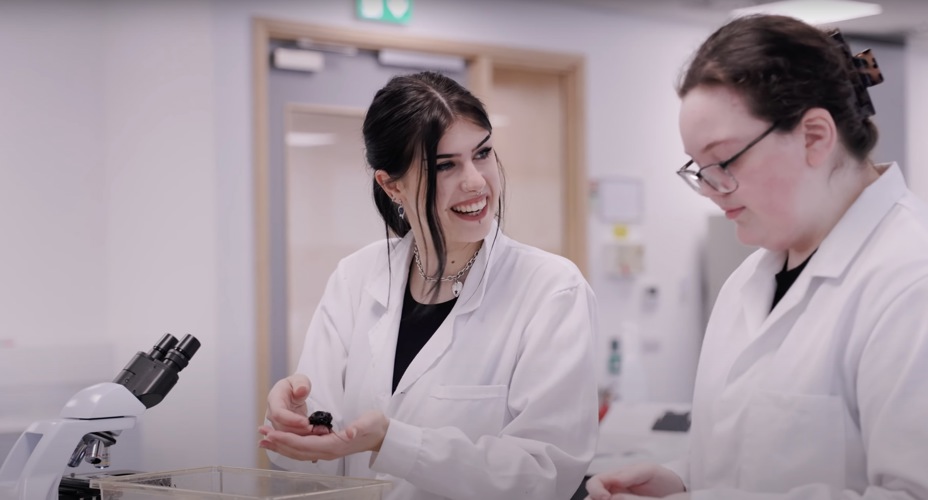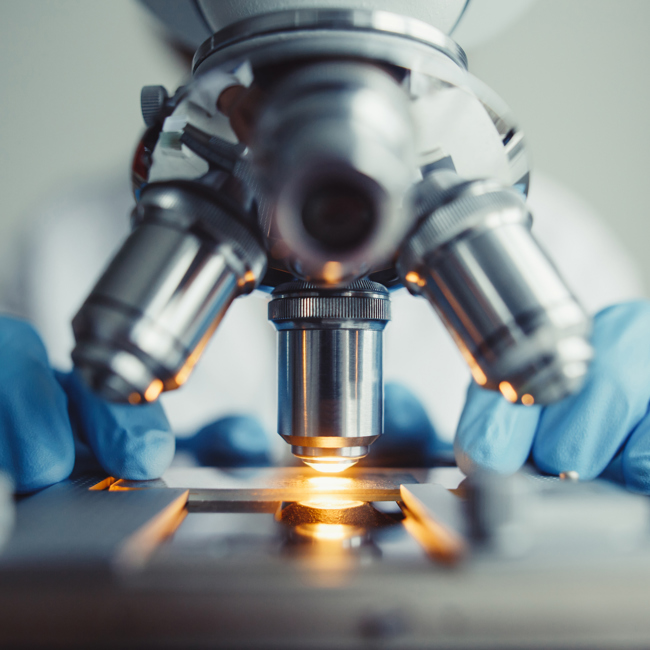Overview | Research Themes | Details | Entry Requirements | How to Apply | Staff | Contact Details |

Bioscience and Human Health
Join a thriving research community, where applied and translational research drives real-world impact in human health and disease. Work alongside a multidisciplinary team of experts tackling major health challenges—from chronic conditions like COPD, arthritis, cancer, and dementia to infection control, microbiology, and antimicrobial resistance. Our research aims to inform disease management and drug discovery, ultimately improving health outcomes across society.
Applying for a Research Degree
UWS research strengths include:
- Chronic disease
- Infection and infection control
- Microbiology and antimicrobial resistance
- Translational and basic biomedical science
Postgraduate researchers benefit from a strong track record in doctoral training, expert mentoring, and a supportive, inclusive environment designed to foster innovation and success.
Current Research Themes & Areas of Expertise
We welcome applications from anyone whose research ambitions link, however broadly, with our research expertise, and members of the team are happy to discuss the possibility of developing studentship and funding applications.
Current research expertise and research areas that can be supported include:
- Biochemistry and pharmacology
- Cell and molecular biology
- Genetics
- Extracellular matrix biology
- Immunology
- Vascular physiology
- 3D culture (air liquid interface or ALI and organoids)
- Microbiology and infection
- Antimicrobial resistance
- Microbial ecology
Current research projects supported by our staff include:
Chronic Disease
Ongoing research includes projects looking at the G-protein coupled receptor, protease activated receptor 2 (PAR2) in chronic disease. Specific projects include investigation of the role of PAR2 in COPD lung inflammation, tissue remodelling, autophagy and senescence. Patients with COPD are susceptible to infection-linked exacerbation of symptoms, which can result in hospitalisation and irreversible loss of lung function. Understanding the role of PAR2 in COPD progression and exacerbation will provide insight into mechanisms which drive lung inflammation and provide opportunity for early targeted treatment to preserve respiratory function.
Other research projects are focused on senescence and aging in melanoma, and basic molecular mechanisms involved in pancreatic cancer.
Microbiology and Health
Microbes play a critical role in human life and health. Ongoing projects are focused on better understanding microbes and their impacts, both positive and negative, on human health. This includes research studies focused on ecology, biodiversity, microbial survival, host-pathogen interaction, parasitology healthcare associated infection, disinfection, antibiotic resistance, and environmental impact.
United Nations' Sustainable Development Goals (SDGs)
Our research activities in environment and animal health directly map to the following UN SDGs.
- SDG 3 – Good Health and Well-being
- SDG 10 – Reduced Inequalities
- SDG 11 – Sustainable Cities and Communities
In the Times Higher Education Impact Rankings 2024, UWS was officially recognised in the top 400 universities worldwide as assessed against the United Nations’ Sustainable Development Goals (SDGs). UWS was recognised as the 2nd most impactful university in Scotland, and 16th globally, for 'reducing inequalities' (UN SDG 10).
Entry Requirements
MRes / MPhil / MPhil-PhD
The minimum requirements for an applicant for registration for the degree of MRes or MPhil or for the degree of MRes/MPhil with the intention of transfer to PhD shall be a first or second class honours degree of a university in the United Kingdom, or of an equivalent qualification.
Applicants holding qualifications other than those specified in (above) shall be considered on their merits and in relation to the nature and scope of the programme of work proposed.
PhD - direct application
Direct registration for the degree of PhD may also be approved, at the discretion of the University if the applicant holds an MRes/MPhil degree of a United Kingdom University, or an MRes/MPhil degree of equivalent standard of a non-UK University, provided that the MRes/MPhil degree is in a subject area which is appropriate to the proposed programme of work.
Exceptionally, direct registration for the degree of PhD may also be approved, at the discretion of the University, even if the applicant is not the holder of an MRes/MPhil degree, but does hold an exceptionally high-quality honours degree or taught master’s degree (or equivalent) in an appropriate discipline, AND has appropriate research experience at postgraduate level which has resulted in significant peer-reviewed publications, and where verifiable evidence of accomplishment is supplied.
English Language Requirements
For applicants whose first language is not English, the University sets a minimum English Language proficiency level. The qualifications below must have been gained within two years of the start of your course.
General English language requirements at UWS: International English Language Testing System (IELTS) Academic module (not General Training)
For our research degrees (MRes, MPhil, PhD, DBA, DProf), applicants are required to have an IELTS score as follows:
- Overall score of 6.5
- No sub-test less than 6.0
ENGLISH LANGUAGE REQUIREMENTS

Bioscience and Human Health – PhD
Qualification: Doctor of Philosophy degree
School: School of Health and Life Sciences
Campus(es): Ayr, Dumfries, Lanarkshire and Dumfries
Start date: October, February, April, or June
Admissions Deadline: September, January, March, or May
Duration: Minimum of 36 months full-time or 72 months part-time
Fees: Tuition Fees for Research Degrees
HOW TO APPLY
Applying for postgraduate research study at UWS has never been simpler. Click the link below to find more information about:
- Postgraduate Research step-by-step guide – everything you need to know to submit a successful application
- Link to our online application system
Research Staff
Professor W Gordon MacKay
Infectious disease, healthcare associated infection, Infection prevention and control, biofilms.
Dr Kiri Rodgers
Specialises in environmental biogeochemistry with a focus on monitoring transmission of anthropogenic pollutants in different environments and climates. This includes interdisciplinary work bridging the gap of pollution on the spread of pathogenic species and antimicrobial resistance.
Dr Gary Litherland
Cell and Matrix Biologist.
Dr Anne Crilly
Immunologist
Dr Farah Jaber
Cancer Biology and Alzheimer’s Disease.
Dr Amelie Juin
Cancer Biology.
CONTACT DETAILS
Please direct general enquiries to healthandlifesciences@uws.ac.uk
